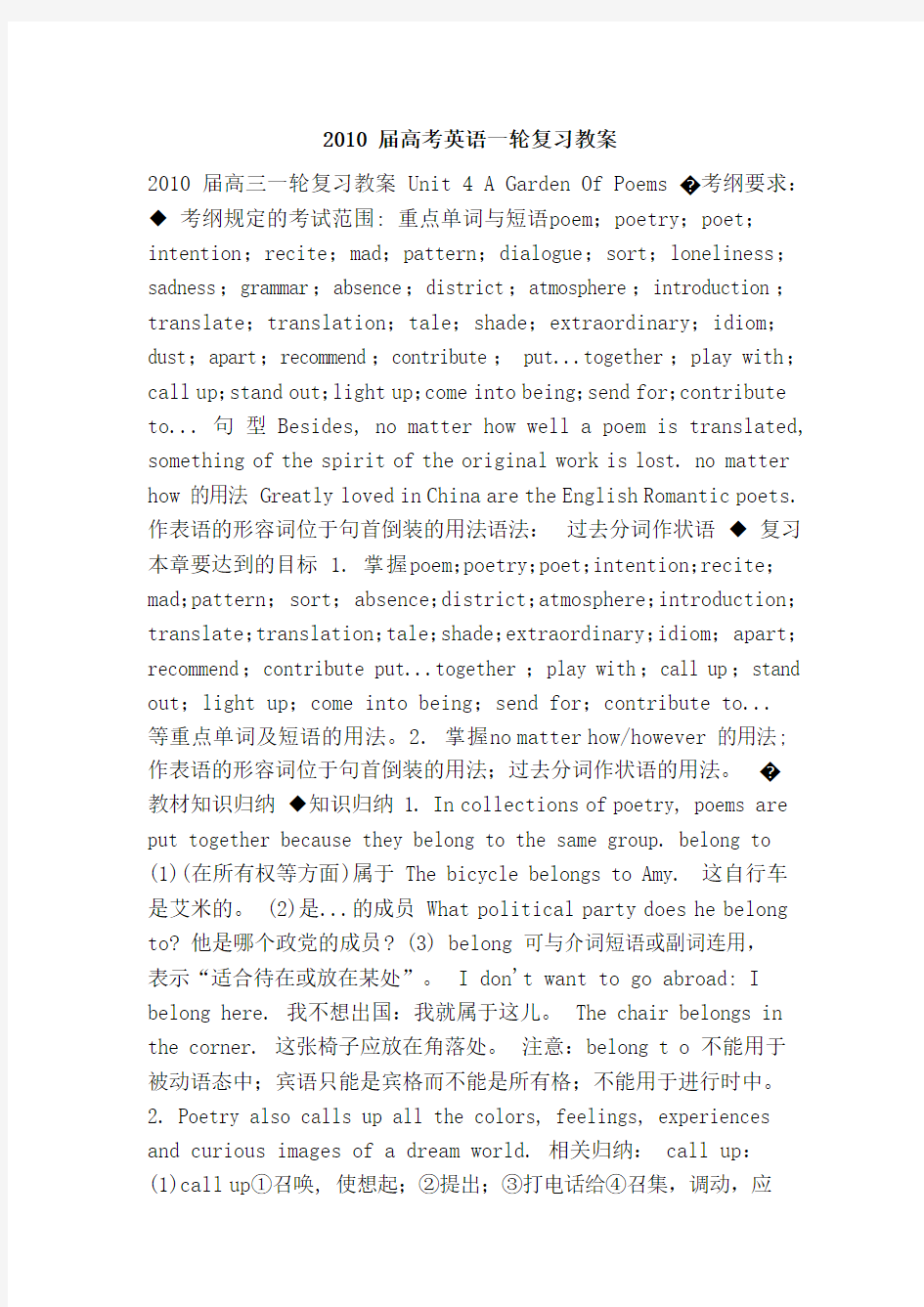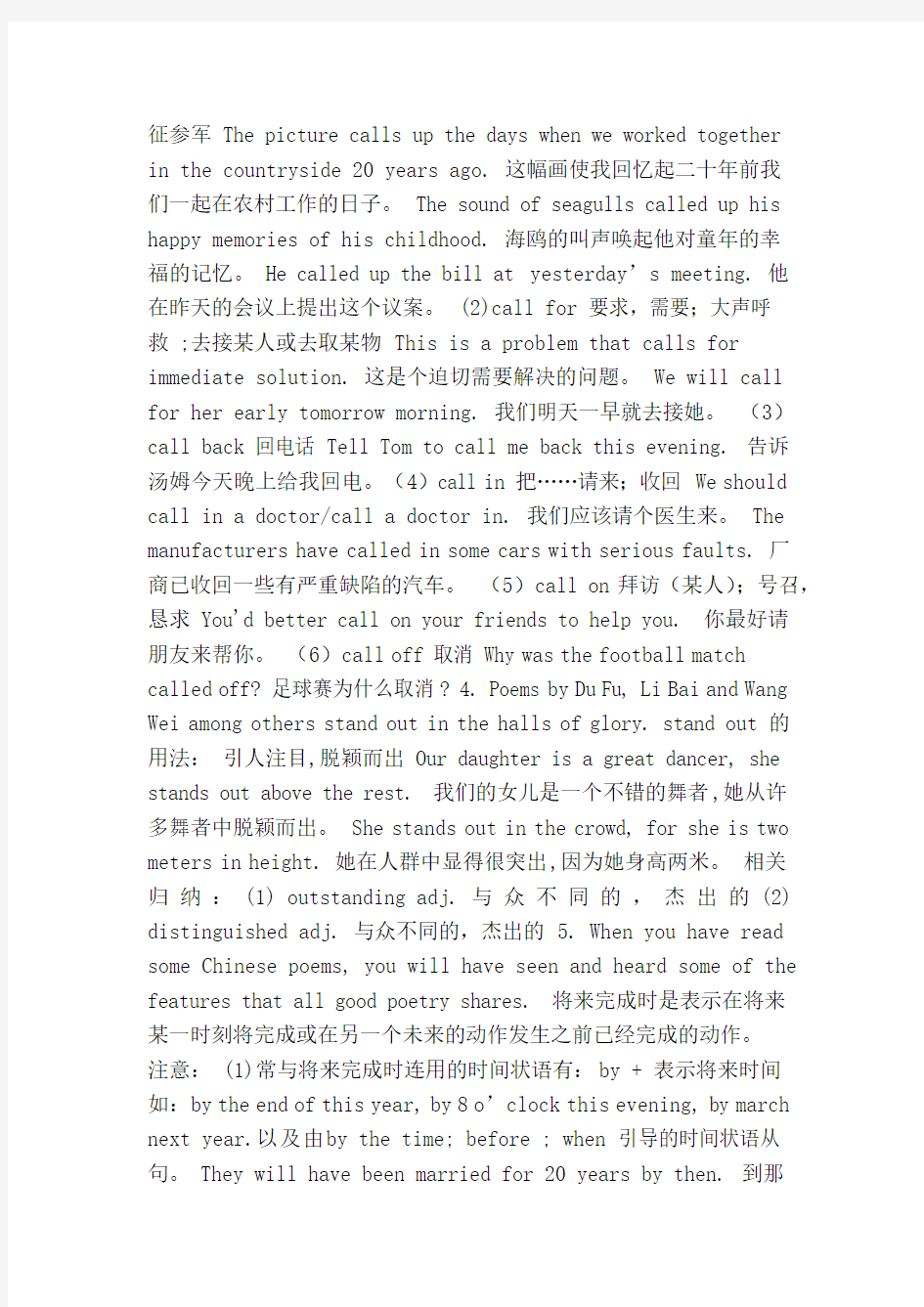高考英语一轮复习教案


2010 届高考英语一轮复习教案
2010 届高三一轮复习教案 Unit 4 A Garden Of Poems ?考纲要求:◆考纲规定的考试范围: 重点单词与短语poem;poetry;poet;intention;recite;mad;pattern;dialogue;sort;loneliness;sadness;grammar;absence;district;atmosphere;introduction;translate;translation;tale;shade;extraordinary;idiom;dust;apart;recommend;contribute; put...together;play with;call up;stand out;light up;come into being;send for;contribute to... 句型 Besides, no matter how well a poem is translated, something of the spirit of the original work is lost. no matter how 的用法 Greatly loved in China are the English Romantic poets. 作表语的形容词位于句首倒装的用法语法:过去分词作状语◆ 复习本章要达到的目标 1. 掌握poem;poetry;poet;intention;recite;mad;pattern;sort;absence;district;atmosphere;introduction;translate;translation;tale;shade;extraordinary;idiom;apart;recommend;contribute put...together;play with;call up;stand out;light up;come into being;send for;contribute to...
等重点单词及短语的用法。2. 掌握no matter how/however 的用法; 作表语的形容词位于句首倒装的用法;过去分词作状语的用法。?
教材知识归纳◆知识归纳 1. In collections of poetry, poems are put together because they belong to the same group. belong to (1)(在所有权等方面)属于 The bicycle belongs to Amy. 这自行车
是艾米的。 (2)是...的成员 What political party does he belong to? 他是哪个政党的成员? (3) belong 可与介词短语或副词连用,
表示“适合待在或放在某处”。 I don't want to go abroad: I belong here. 我不想出国:我就属于这儿。 The chair belongs in the corner. 这张椅子应放在角落处。注意:belong t o 不能用于
被动语态中;宾语只能是宾格而不能是所有格;不能用于进行时中。2. Poetry also calls up all the colors, feelings, experiences and curious images of a dream world. 相关归纳: call up:(1)call up①召唤, 使想起;②提出;③打电话给④召集,调动,应
征参军 The picture calls up the days when we worked together in the countryside 20 years ago. 这幅画使我回忆起二十年前我
们一起在农村工作的日子。 The sound of seagulls called up his happy memories of his childhood. 海鸥的叫声唤起他对童年的幸
福的记忆。 He called up the bill at yesterday’s meeting. 他
在昨天的会议上提出这个议案。 (2)call for 要求,需要;大声呼
救 ;去接某人或去取某物 This is a problem that calls for immediate solution. 这是个迫切需要解决的问题。 We will call for her early tomorrow morning. 我们明天一早就去接她。(3)call back 回电话 Tell Tom to call me back this evening. 告诉
汤姆今天晚上给我回电。(4)call in 把……请来;收回 We should call in a doctor/call a doctor in. 我们应该请个医生来。 The manufacturers have called in some cars with serious faults. 厂
商已收回一些有严重缺陷的汽车。(5)call on 拜访(某人);号召,恳求 You'd better call on your friends to help you. 你最好请
朋友来帮你。(6)call off 取消 Why was the football match called off? 足球赛为什么取消? 4. Poems by Du Fu, Li Bai and Wang Wei among others stand out in the halls of glory. stand out 的
用法:引人注目,脱颖而出 Our daughter is a great dancer, she stands out above the rest. 我们的女儿是一个不错的舞者,她从许
多舞者中脱颖而出。 She stands out in the crowd, for she is two meters in height. 她在人群中显得很突出,因为她身高两米。相关
归纳: (1) outstanding adj. 与众不同的,杰出的 (2) distinguished adj. 与众不同的,杰出的 5. When you have read some Chinese poems, you will have seen and heard some of the features that all good poetry shares. 将来完成时是表示在将来
某一时刻将完成或在另一个未来的动作发生之前已经完成的动作。
注意: (1)常与将来完成时连用的时间状语有:by + 表示将来时间如:by the end of this year,by 8 o’clock this evening, by march next year.以及由by the time; before ; when 引导的时间状语从句。 They will have been married for 20 years by then. 到那
时他们结婚将有二十年了。I shall have finished this composition before 9 o’clock.我将在9 点前完成这篇作文。When we get on the railway station, the train will probably have left. 当我们到火车站的时候,火车可能已经离开了。 You will have reached Shanghai by this time tomorrow. 明天此时,你已经到达
上海了。(2)在时间和条件状语从句中用现在完成时代替将来完成时。Once you have understood it, you'll find it very interesting. 一旦你理解了,你就会发现很有意思。 When you have finished the experienced, please put everything back. 当你完成实验的时候
请把一切放回远处Don’t get off the bus until it has stopped. 直到车停的时候在下车。 6.Shakespeare is most famous for his plays. most = very 用来加强语气 She was most kind to me. 她对我很友好。 a most adj.= a very adj. the most+形容词”为形容词的最高级形式,常用于有一定范围限制的情况。 Lesson 12 is a most difficult one, but it is not the most difficult one in BookⅡ 第12 课是非常难的一课但是不是这本书中最难的一课。
This is the most interesting book I have ever read. 这是我们所读的最有趣的书。相关归纳:英语中表示非常的结构① I’m terribly sorry. 我非常遗憾。② The movie was pretty good. 这
部电影相当好看。③ We were greatly shocked at the news. 我
们对这则消息相当震惊。④ The boss felt quite pleased with my work. 老板对我的工作相当满意。⑤ We were extremely excited at the news. 我们对这则消息相当兴奋。⑥ What I said is perfectly clear. 我说的相当明显。⑦I am awfully/deadly/considerably thankful to you. 我非常感激你。⑧I felt totally exhausted by the time I got home. 当我到家时我完全累坏了。 (2) for “对于……来说;就……而言” You are tall enough for your age. Don’t be too tense. 相对于你的年龄你已经相当高了,不要太在
意了。 It is cold for May. 就五月份来说,天气够冷的。 7.Modern English came into being from about the end of the 16th century. come into being 形成,产生,开始存在 We don't know when the
universe came into being. 我们不知道宇宙是在何时开始存在的。The football club came into being in 1900. 这个足球俱乐部诞生于1900 年。相关归纳: (1)bring...into being 使形成,使产生 Our country brought the Hope Project into being to help the children dropping out of school. 我们的国家建立了希望工程是为了去帮助失学的儿童。 (2)for the time being 暂时,眼下 I have no more money on me for the time being. 我此刻身上没有钱。 (3) come into effect / force 开始实施;生效 The new law came into effect last week. 新的法律上周生效。 come into use / service 开始使用 The washing center will come into service next week. 这个洗浴中心下周开始使用。come into power 开始执政;上台 The manager came into power 3 years ago. 经理是在3 年前上台的。come into view / sight 进入视线 The land came into view eventually after 5 days’ voyage. 经过5 天的航行之后终于看到了陆地。 come into fashion 开始流行 The jeans have come into fashion recently. 牛仔裤最近已经再次流行。 8. Why read, and sometimes even write poetry? (1) Why+不带to 的不定式用来表示某动作没有必要或意义;肯定形式有时还含有责备的意味. Why argue with him? He’ll never change his mind. 为什么要跟他争论?他永远也不会改变看法的 Why come so late? 为什么这么晚才来? (2)why (not) do sth. 否定形式则常用来表示建议。why not do... = why don't you do... It looks like rain. Why not take a raincoat? 快要下雨了,你为什么不带件雨衣呢?Since you have to stay at home, why don’t you do some reading? 既然你必须呆在家里,为什么不读点书呢?另外,Why not? 也可以单独使用,表示“为什么不行?”“好啊”“请别客气”---You shouldn’t go out with me. ---Why not? “你不该跟我出去。”“为什么不行?”---Let’s go to the cinema.
---Why not? “我们去看电影吧。” “好啊。(为什么不呢?)”
9. I'll be right here waiting for you. right adv. 不偏不倚地, 正好;恰好,就 Your glasses are right here on the table. 你的
眼镜就在这儿桌子上。 He stands right in the middle of the road. 他就站在路的中央。相关归纳:修饰介词短语的副词: (1)far 到很深的程度;到很远的距离 He often works far into the night. 他常常工作到深夜。 They went far into the forest to pursue the wounded bear. 他们深入森林,追捕那只受伤的熊。(2)well 相当地, 颇,很 Her son is well past forty. 她儿子已四十好几岁了。
(3)much 非常;很 He is much like his father. 他极其像他的父亲。
(4)quite 完全,彻底 She wore a hat quite out of fashion. 她戴着一顶完全过时的帽子。(5)all 完全地;全然地 She is all in favor of my suggestion. 她完全赞同我的建议。 10. Ask your teacher to recommend poems to you. recommend 的用法派生词:recommendation n.推荐;介绍信知识梳理: (1)recommend sb. sth.= recommend sth. to sb. 向某人推荐/介绍…… Can you recommend me some new books on this subject? 你能推荐一些有关这个学科的新书给我吗? (2)recommend sb. for... 推荐某人做(某职位) I'll recommend him for the job. 我要推荐他做这项工作。 (3)recommend sb. as... 推荐某人为…… I'll recommend him as our guide. 我要推荐他当我们的导游。(4)recommend doing sth. 建议做某事 I recommend buying this dictionary. 我建议买这种字典。 (5) recommend sb. to do sth. 建议,劝告某人去做某事 I recommend you to comply with safety regulations. 我劝你遵守安全规则。(6)recommend +that-clause 建议……(从句中用should + 动词原形,should 可省去) He recommended that we (should)read the novel. (= He recommended us to read the novel.)他建议我们读一读那部小说。 11. Collect your favourite poems in a notebook and ask your friends to contribute to it. contribute vt./vi. (多与介词to/towards 搭配) (1)捐(款);捐献,捐助 He contributed half of his savings to the relief fund. 他将积蓄的一半捐献给救济基金会。 He contributed generously to the Red Cross. 他对红十字会慷慨捐助。 (2)贡献,提供 He didn't contribute one idea to the document. 他对这个文件没有提供一
个主意。 He never contributes to the discussion. 他在讨论时
从不发表意见。 (3)投(稿) The scientist often contributes to an academic journal. 这位科学家常常给那家学术期刊撰稿。相关归纳: (1) contribute to 捐助;帮助 How much did you contribute
to the relief fund? 你为那笔救济金捐了多少? 促成 Your suggestion has greatly contributed to the accomplishment of our work. 你的建议大大地促进了我们工作的完成。为...写稿 She has been contributing to the paper for 5 years. 五年以来,她一直
在为那家报纸撰搞。(2)make a contribution to...为……做贡献;为……捐款(to 为介词) I made a contribution of $100 to the Famine Relief Fund. 我向救灾基金会捐献了一百元钱。 The invention of paper was a great contribution to human civilization. 纸的发明是对人类文明的一大贡献。◆概念提示重
点/热点 1:But whether buses or trains or boarding aero planes, there wasn't a door she'd get through. whether...or...的用法:(1)引导让步状语从句(从句还可以采用省略形式) He did it whether by accident or design. 不知道是偶然还是有意,他的确
做了这件事。 Whether he drives or takes the train,he'll be here on time. 不管他是开车还是乘火车来,他总会准时到达的。 Whether she is sad or angry, she shows everything on her face. 不管
是高兴还是难过她总是把一切都写在脸上。 (2)引导名词性从句 It
is uncertain whether she will pass or fail. 她是通过了考试还
是失败了这一点还不知道。 It makes no matter whether you leave today or tomorrow. 你是今天走还是明天走无关紧要相关归纳:
(1`)either...or...意为"或者……或者……;不是……就是……" 之意。表示两者之一,连接句子中两个并列的成分。either...or... 连
接两个主语时,其谓语动词应与最近的一个主语在人称和数上保持一致。When the girl is happy, she either sings or dances. 那个女孩高兴时,不是唱就是跳。 Either you or I am going there tomorrow. 明天要么你去那里,要么我去那里。注意:如果把上句变成一般疑问句,助动词形式与主语 you 保持一致,所以要用 are 提
问,而不是am。 Are either you or I going there tomorrow? 明
天是你还是我去那里? Either you or he has lunch at school. 其
一般疑问句应为:Do either you or he have lunch at school? 是
你还是他在学校吃午饭? (2)neither...nor...表示"既不……也不……"。其含义是否定的,可连接任意两个并列的成份。当neither...nor...连接两个主语时,也应遵循"就近原则"。 She
likes neither butter nor cheese. 她既不喜欢黄油也不喜欢乳酪。Neither dad nor mum is at home today. 今天父母都不在家易混易错点 1:过去分词作状语一、过去分词作状语时的功能及位置 1. 过
去分词作状语,修饰谓语动词,进一步说明谓语动词的动作和状态,即
动作发生时的背景或状况,其逻辑主语通常就是句子的主语,且主语是
过去分词动作的承受者,即过去分词表示的动作不是句子的主语发出的;过去分词与主语之间是动宾关系,即被动关系。 Although built
thirty years ago, the house looks very beautiful. 尽管这座房
子是 30 年前被建造的,它看起来依然很漂亮。 2. 过去分词短语作条件、原因及时间状语时,通常放在句首;作伴随、结果状语时,通常放
在句末;作方式状语时,一般放在句末,有时也放在句首;作让步状语时,一般放在句首,有时也放在句末。 Given more time, he can do
it better. 如果他被给予更多的时间,他就能把它做得更好。二、
与状语从句的转换 1. 过去分词短语作时间状语,可转换为when,
while 或after 等引导的状语从句。 Seen from the top of the hill, the park looks more beautiful. →When it is seen from the top of the hill, the park looks more beautiful. 从山上往下看,这
座公园看起来更加漂亮。 2. 作条件状语,可转换为if, once 或
unless 等引导的状语从句。 United we will stand; divided we
will fall. →If we are united we will stand; if we are divided we will fall. 团结就是胜利;分裂必然失败。 3. 作原因状语,可
转换为as, since 或because 等引导的状语从句。Encouraged by the progress he has made, he works harder. →As he is encouraged
by the progress he has made, he works harder. 由于受到所取得成
绩的鼓舞,他工作更努力了。 4. 作让步状语,可
转换为although, though 或even if 等引导的状语从句。 Although exhausted by the climb, we continued our journey. →Although we were exhausted by the climb, we continued our journey. 我
们虽然爬得很累,但我们仍然继续我们的旅程。 5. 作方式状语,如
有连词as if,就转换为as if 引导的方式状语从句;若无连词,则
转换为并列结构。 He began to cry as if bitten by a snake. →He began to cry as if he was bitten by a snake. 他大叫起来,好
像被蛇咬了。 6. 作伴随状语,一般转换为并列结构。 Aunt Wu came in, followed by her daughter. →Aunt Wu came in, and (she) was followed by her daughter. 吴大娘走进来,(她)后面跟着她的女儿。?讲题组◆课内题例与课后题:课内题例 1. I'm terribly sorry to tell you that your work is far from . A. satisfying
B. a satisfaction
C. being satisfactory
D. to satisfy 解析:
此题主要考查 far from 的用法。satisfaction 是不可教名词,前
不可使用a。from 后不可接不定式。satisfying 虽然意思与satisfactory 相同,但常使用satisfactory,其中being 经常省略。
答案: 2. -- Will somebody go and get Dr. White? - He's already been――. A. sent for B. called for C .gone for D .picked up
变式1. Please wait at the gate at 5 o’clock,and I will
you. A. send for B. call for C .pick out D .pick up 变式2. On her way home from work, she her daughter from the kindergarten. A. send for B. call for C .go for D .pick up 解析: 2. send for 是指派人去请来某人;call for 是指专程去接某人;
go for=call for; pick up 是指顺路捎带、顺路搭载的意思。该题
的意思是“已经派人去请他了”医生与请之间是被动关系,所以答案为:A 变式1. 该题的意思是“5 点钟的时候在门口等我,我其接你”由此
可知是专程接,所以答案为:B 变式2. 该题的意思是“在她下班回
家的路上,她把女儿从幼儿园里接了回来”由此可知是顺路捎带,所
以答案为:D3. Classroom testing, if well done, most certainly as a stimulus (刺激) to study and real learning. A. uses B. looks C. acts D. does 变式1. He is always his teachers’
